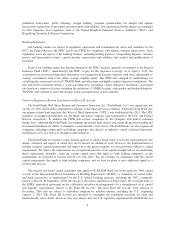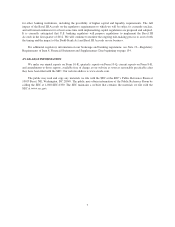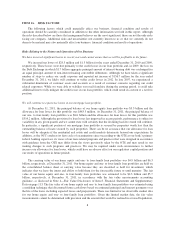eTrade 2011 Annual Report Download - page 19
Download and view the complete annual report
Please find page 19 of the 2011 eTrade annual report below. You can navigate through the pages in the report by either clicking on the pages listed below, or by using the keyword search tool below to find specific information within the annual report.However, it is possible that our regulators may impose more stringent capital and other prudential standards on
us prior to the end of the five year phase-in period. For example, both the Federal Reserve and the OCC have
proposed rules that would ultimately require the parent company and E*TRADE Bank, respectively, to conduct
capital adequacy stress tests on their operations.
The Dodd-Frank Act requires various federal agencies to adopt a broad range of new rules and regulations,
the details, substance, and impact of which may not be known for months or years. It is difficult to predict at this
time what specific impacts the Dodd-Frank Act and the yet-to-be-written rules and regulations may have on us.
However, given that the legislation is likely to materially change the regulatory environment for the financial
services industry in which we operate, we expect at a minimum that our compliance costs will increase.
If we fail to comply with applicable securities and banking laws, rules and regulations, either domestically or
internationally, we could be subject to disciplinary actions, damages, penalties or restrictions that could
significantly harm our business.
The SEC, FINRA and other self-regulatory organizations and state securities commissions, among other
things, can censure, fine, issue cease-and-desist orders or suspend or expel a broker-dealer or any of its officers
or employees. The OCC and Federal Reserve may take similar action with respect to our banking and other
financial activities, respectively. Similarly, the attorneys general of each state could bring legal action on behalf
of the citizens of the various states to ensure compliance with local laws. Regulatory agencies in countries
outside of the U.S. have similar authority. The ability to comply with applicable laws and rules is dependent in
part on the establishment and maintenance of a reasonable compliance system. The failure to establish and
enforce reasonable compliance procedures, even if unintentional, could subject us to significant losses or
disciplinary or other actions.
If we do not maintain the capital levels required by regulators, we may be fined or even forced out of business.
The SEC, FINRA, the OCC, the Federal Reserve and various other regulatory agencies have stringent rules
with respect to the maintenance of specific levels of regulatory capital by banks and net capital by securities
broker-dealers. E*TRADE Bank is subject to various regulatory capital requirements administered by the OCC,
and E*TRADE Financial Corporation will, for the first time, become subject to specific capital requirements
administered by the Federal Reserve. Failure to meet minimum capital requirements can trigger certain
mandatory, and possibly additional discretionary actions by regulators that, if undertaken, could harm E*TRADE
Bank’s and E*TRADE Financial Corporation’s operations and financial statements.
E*TRADE Bank must meet specific capital guidelines that involve quantitative measures of E*TRADE
Bank’s assets, liabilities and certain off-balance sheet items as calculated under regulatory accounting practices.
Quantitative measures established by regulation to ensure capital adequacy require E*TRADE Bank to maintain
minimum amounts and ratios of total and Tier I capital to risk-weighted assets and of Tier I capital to adjusted
total assets. To satisfy the capital requirements for a “well capitalized” financial institution, E*TRADE Bank
must maintain higher total and Tier I capital to risk-weighted assets and Tier I capital to adjusted total assets
ratios. E*TRADE Bank’s capital amounts and classification are subject to qualitative judgments by the regulators
about the strength of components of its capital, risk weightings of assets, off-balance sheet transactions and other
factors. Any significant reduction in E*TRADE Bank’s regulatory capital could result in E*TRADE Bank being
less than “well capitalized” or “adequately capitalized” under applicable capital rules. A failure of E*TRADE
Bank to be “adequately capitalized” which is not cured within time periods specified in the indentures governing
our debt securities would constitute a default under our debt securities and likely result in the debt securities
becoming immediately due and payable at their full face value.
The regulators may request we raise equity to increase the regulatory capital of E*TRADE Bank or to
further reduce debt. If we were unable to raise equity, we could face negative regulatory consequences, such as
restrictions on our activities, requirements that we divest ourselves of certain businesses and requirements that
we dispose of certain assets and liabilities within a prescribed period. Any such actions could have a material
negative effect on our business.
16
























